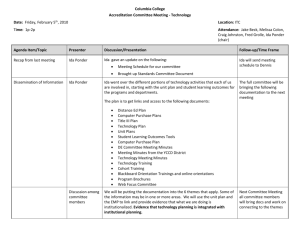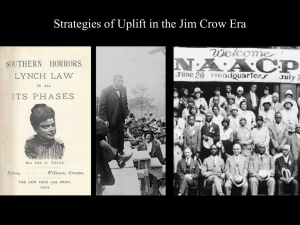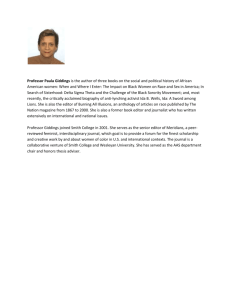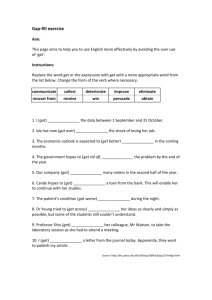Biography: Where did Ida B. Wells grow up?
advertisement
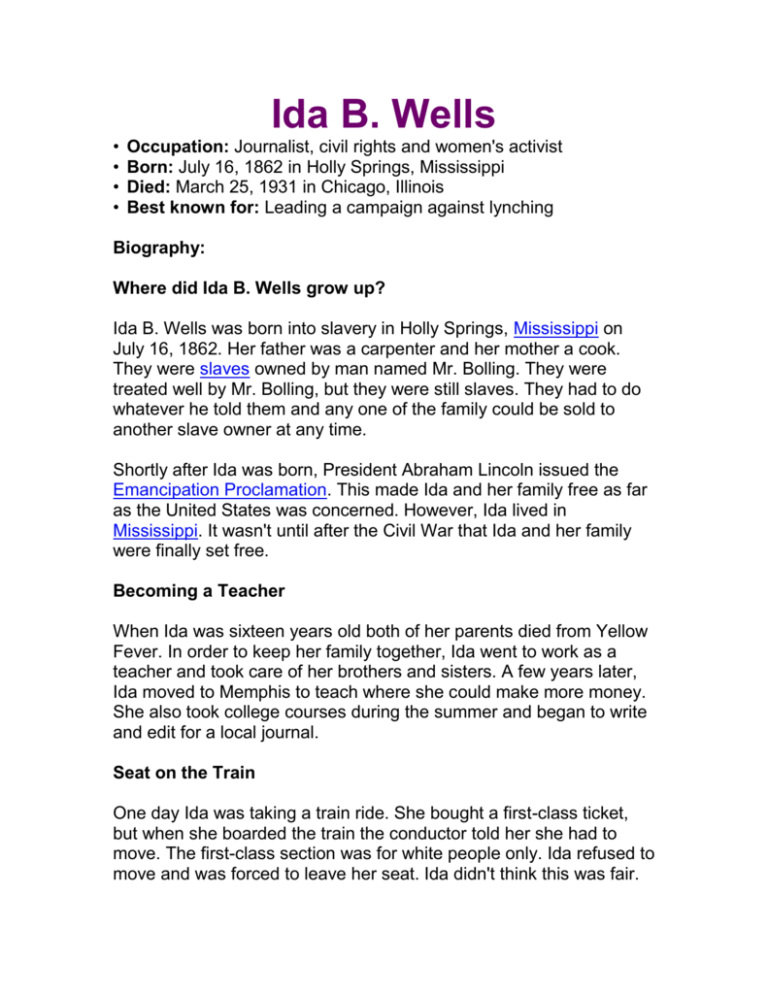
Ida B. Wells • • • • Occupation: Journalist, civil rights and women's activist Born: July 16, 1862 in Holly Springs, Mississippi Died: March 25, 1931 in Chicago, Illinois Best known for: Leading a campaign against lynching Biography: Where did Ida B. Wells grow up? Ida B. Wells was born into slavery in Holly Springs, Mississippi on July 16, 1862. Her father was a carpenter and her mother a cook. They were slaves owned by man named Mr. Bolling. They were treated well by Mr. Bolling, but they were still slaves. They had to do whatever he told them and any one of the family could be sold to another slave owner at any time. Shortly after Ida was born, President Abraham Lincoln issued the Emancipation Proclamation. This made Ida and her family free as far as the United States was concerned. However, Ida lived in Mississippi. It wasn't until after the Civil War that Ida and her family were finally set free. Becoming a Teacher When Ida was sixteen years old both of her parents died from Yellow Fever. In order to keep her family together, Ida went to work as a teacher and took care of her brothers and sisters. A few years later, Ida moved to Memphis to teach where she could make more money. She also took college courses during the summer and began to write and edit for a local journal. Seat on the Train One day Ida was taking a train ride. She bought a first-class ticket, but when she boarded the train the conductor told her she had to move. The first-class section was for white people only. Ida refused to move and was forced to leave her seat. Ida didn't think this was fair. She sued the train company and won $500. Unfortunately, the Tennessee Supreme Court overturned the decision later. The Free Speech Ida began to write articles about the racial injustices of the South. At first she wrote articles for local newspapers and magazines. Then she began her own newspaper called the Free Speech where she wrote about racial segregation and discrimination. Lynching In 1892, one of Ida's friends, Tom Moss, was arrested for murdering a white man. Tom had been protecting his grocery store when some white men broke in to destroy the store and put him out of business. Tom was hoping that the judge would understand that he was just protecting himself. However, before he could go to trial, he was killed by a mob. This type of killing without a trial was called a lynching. Ida wrote about the lynching in her paper. This made many people mad. Ida fled to New York to be safe. The offices of the Free Speech in Memphis were destroyed and Ida decided to stay in New York and go to work for a New York newspaper called the New York Age. There she wrote articles about lynching that let people throughout the country understand how often innocent African-Americans were being killed without a trial. Ida's efforts had a great impact in lowering the number of lynchings that occurred throughout the country. Civil Rights Activist Over time, Ida became famous through her writings about racial issues. She worked with African-American leaders such as Frederick Douglass and W.E.B Du Bois to fight discrimination and segregation laws. Ida also believed in women's rights including the right for women to vote. She founded the first black women's suffrage association in 1913 called the Alpha Suffrage Club. Legacy Ida is remembered as one of the early leaders in the fight for African- American Civil Rights. Her campaign against lynching helped to bring to light the injustice of the practice to the rest of the United States and the world. Ida died from kidney disease in Chicago on March 25, 1931. Interesting Facts about Ida B. Wells • Ida was one of the original founders of the National Association for the Advancement of Colored People (NAACP). • She married Ferdinand Barnett in 1898. Ida and Ferdinand had four children. • She ran for the Illinois state senate in 1930, but lost. • She started the first African-American kindergarten in Chicago. • Ida once said that "the people must know before they can act, and there is no educator to compare to the press."
